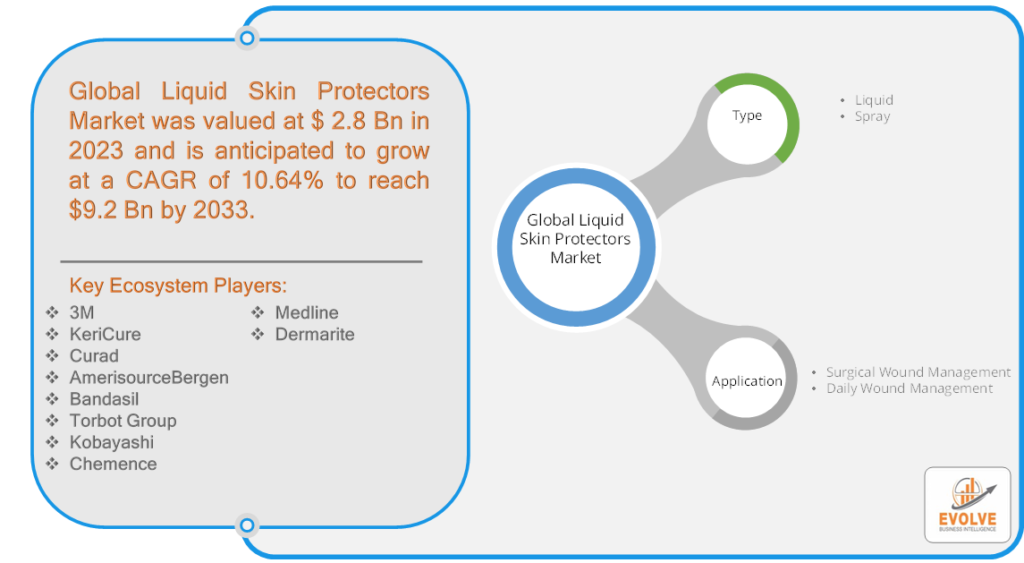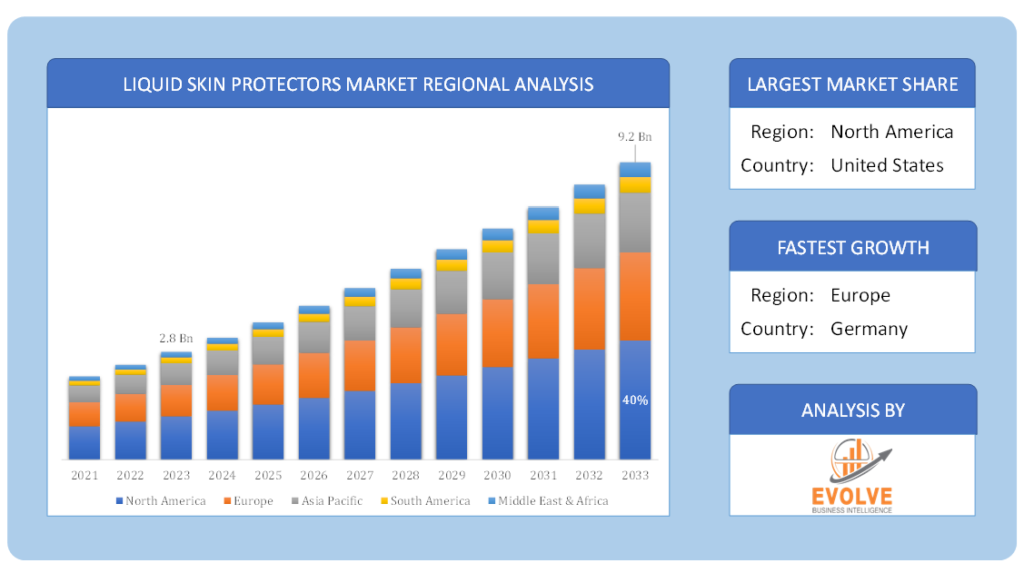Liquid Skin Protectors Market Analysis and Global Forecast 2023-2033
$ 1,390.00 – $ 5,520.00Price range: $ 1,390.00 through $ 5,520.00
Liquid Skin Protectors Market Research Report: Information By Type (Liquid, Spray), By Application (Liquid Skin Protectors, Daily Wound Management), and By Region — Forecast till 2033
Liquid Skin ProtectorsMarket Overview
The global Liquid Skin Protectors Market Size is expected to reach USD 9.2 Billion by 2033. The global Liquid Skin Protectorsindustry size accounted for USD 2.8 Billion in 2023 and is expected to expand at a compound annual growth rate (CAGR) of 10.64% from 2023 to 2033. Liquid skin protectors have emerged as a revolutionary solution in the field of wound care. These innovative products are designed to provide a protective barrier for the skin, helping to prevent infection and promote healing. Liquid skin protectors are available in various forms, including liquid and spray, and find extensive applications in areas such as wound management, skincare, and cosmetics.
The primary function of liquid skin protectors is to create a protective layer over the skin, acting as a barrier against moisture, bacteria, and other external contaminants. This not only helps to prevent infection but also facilitates the natural healing process of the skin. Liquid skin protectors are widely used in the medical field for treating cuts, abrasions, and surgical incisions, as well as in everyday wound management.
Global Liquid Skin Protectors Market Synopsis
The COVID-19 pandemic has had a significant impact on various industries, including the liquid skin protectors market. With the increased focus on hygiene and infection prevention, the demand for liquid skin protectors witnessed a surge during the pandemic. Healthcare facilities, including hospitals and clinics, prioritized the use of liquid skin protectors to safeguard patients and healthcare workers from potential infections.
Post-COVID, the market for liquid skin protectors is expected to continue its growth trajectory. The heightened awareness regarding hygiene and wound care, coupled with the increasing prevalence of chronic wounds and injuries, will drive the demand for liquid skin protectors in the coming years. The market is projected to witness substantial growth as healthcare systems focus on improving wound care practices and reducing the risk of infections.
Liquid Skin ProtectorsMarket Dynamics
The major factors that have impacted the growth of Liquid Skin Protectors are as follows:
Drivers:
Ø Technological Advancements in Liquid Skin Protectors
Technological advancements play a crucial role in propelling the liquid skin protectors market forward. Researchers and manufacturers are continually investing in research and development to introduce advanced formulations and application techniques. The introduction of novel ingredients, improved delivery systems, and enhanced product performance are key factors driving the adoption of liquid skin protectors.
One significant technological advancement is the development of liquid skin protectors with antimicrobial properties. These formulations combine the benefits of a protective barrier with the ability to combat bacterial growth, reducing the risk of infections. Such innovations have gained traction among healthcare professionals and consumers, further boosting the demand for liquid skin protectors.
Restraint:
- High Costs Associated with Liquid Skin Protectors
While liquid skin protectors offer a range of benefits, one of the restraining factors for market growth is the relatively high cost associated with these products. Compared to traditional wound care solutions, liquid skin protectors can be more expensive, especially for consumers who require frequent application or have large wounds.
The cost factor presents a challenge, particularly in regions with limited access to healthcare resources or where affordability is a concern. The higher price range of liquid skin protectors can hinder their adoption among certain demographics, limiting market growth to some extent. Manufacturers need to focus on developing cost-effective options without compromising the quality and effectiveness of the products to address this challenge.
Opportunity:
⮚ Rising Demand for Advanced Wound Care Products
The increasing demand for advanced wound care products presents a significant opportunity for the liquid skin protectors market. As the prevalence of chronic wounds, such as diabetic ulcers and pressure sores, continues to rise, healthcare professionals and patients are seeking effective and innovative solutions for wound management.
Liquid Skin ProtectorsSegment Overview
By Type
Based on the Type, the market is segmented based on Liquid, and Spray. the liquid skin protectors segment holds the largest share in the market. Liquid skin protectors provide a convenient and effective solution for protecting the skin against various external factors. They are widely used in healthcare settings for wound care management, as well as in cosmetic and skincare applications. The liquid form allows for easy application and quick drying, making it a popular choice among consumers.
By Application
 Based on Application, the market has been divided into Liquid Skin Protectors, Daily Wound Management. the Liquid Skin Protectors segment holds the largest share in the Liquid Skin Protectors market. The increasing prevalence of chronic wounds, surgical procedures, and injuries is a significant driving factor for the growth of the liquid skin protectors market. The demand for advanced wound care solutions, coupled with the rising awareness regarding infection prevention, has propelled the adoption of liquid skin protectors in various healthcare facilities. Additionally, the expanding cosmetic industry and the growing focus on skincare have further contributed to the market growth.
Based on Application, the market has been divided into Liquid Skin Protectors, Daily Wound Management. the Liquid Skin Protectors segment holds the largest share in the Liquid Skin Protectors market. The increasing prevalence of chronic wounds, surgical procedures, and injuries is a significant driving factor for the growth of the liquid skin protectors market. The demand for advanced wound care solutions, coupled with the rising awareness regarding infection prevention, has propelled the adoption of liquid skin protectors in various healthcare facilities. Additionally, the expanding cosmetic industry and the growing focus on skincare have further contributed to the market growth.
Global Liquid Skin Protectors Market Regional Analysis
Based on region, the global Liquid Skin Protectorsmarket has been divided into North America, Europe, Asia-Pacific, South America and Middle East & Africa. North America is projected to dominate the use of the market followed by the Europe and Asia-Pacific regions.
In North America, the market is witnessing significant growth due to the presence of advanced healthcare infrastructure and a high prevalence of chronic wounds. The region has a well-established healthcare system that emphasizes the importance of wound care management. Moreover, the increasing focus on patient safety and infection control measures has fueled the adoption of liquid skin protectors in hospitals and clinics. The United States, in particular, holds a substantial market share in North America.
Europe Market
In Europe, the liquid skin protectors market is also experiencing notable growth. The region has a large geriatric population, leading to a higher incidence of chronic wounds. The emphasis on wound care and the availability of advanced healthcare technologies have contributed to the market’s expansion. Countries like Germany, the United Kingdom, and France are key contributors to the European market.
Competitive Landscape
The global Liquid Skin Protectors market is highly competitive, with numerous players offering a wide range of software solutions. The competitive landscape is characterized by the presence of established companies, as well as emerging startups and niche players. To increase their market position and attract a wide consumer base, the businesses are employing various strategies, such as product launches, and strategic alliances.
Prominent Players:
- 3M
- KeriCure
- Curad
- AmerisourceBergen
- Bandasil
- Torbot Group
- Kobayashi
- Chemence
- Medline
- Dermarite
Key Development:
March 2023: 3M introduced “SkinGuard Plus,” an innovative liquid skin protector with added antimicrobial properties. This product offers an extra layer of defense against bacteria, reducing the risk of infections in wounds and promoting better wound healing outcomes.
Scope of the Report
Global Liquid Skin Protectors Market, by Type
- Liquid
- Spray
Global Liquid Skin Protectors Market, by Application
- Liquid Skin Protectors
- Daily Wound Management
Global Liquid Skin Protectors Market, by Region
- North America
- US
- Canada
- Mexico
- Europe
- UK
- Germany
- France
- Italy
- Spain
- Benelux
- Nordic
- Rest of Europe
- Asia Pacific
- China
- Japan
- South Korea
- Indonesia
- Austalia
- Malaysia
- India
- Rest of Asia Pacific
- South America
- Brazil
- Argentina
- Rest of SouthAmerica
- Middle East &Africa
- Saudi Arabia
- UAE
- Egypt
- SouthAfrica
- Rest of Middle East & Africa
| Parameters | Indicators |
|---|---|
| Market Size | 2033: $9.2 Billion |
| CAGR | 10.64% CAGR (2023-2033) |
| Base year | 2022 |
| Forecast Period | 2023-2033 |
| Historical Data | 2021 |
| Report Coverage | Revenue Forecast, Competitive Landscape, Growth Factors, and Trends |
| Key Segmentations | Type,Application |
| Geographies Covered | North America, Europe, Asia-Pacific, Latin America, Middle East, Africa |
| Key Vendors | 3M, KeriCure, Curad, AmerisourceBergen, Bandasil, Torbot Group, Kobayashi, Chemence, Medline, and Dermarite |
| Key Market Opportunities | Rising Demand for Advanced Wound Care Products |
| Key Market Drivers | Technological Advancements in Liquid Skin Protectors |
REPORT CONTENT BRIEF:
- High-level analysis of the current and future Liquid Skin Protectors market trends and opportunities
- Detailed analysis of current market drivers, restraining factors, and opportunities in the future
- Liquid Skin Protectors market historical market size for the year 2021, and forecast from 2023 to 2033
- Liquid Skin Protectors market share analysis at each product level
- Competitor analysis with a detailed insight into its product segment, Daily Wound Management strength, and strategies adopted.
- Identifies key strategies adopted including product launches and developments, mergers and acquisitions, joint ventures, collaborations, and partnerships as well as funding taken and investment done, among others.
- To identify and understand the various factors involved in the global Liquid Skin Protectors market affected by the pandemic
- To provide a detailed insight into the major companies operating in the market. The profiling will include the Daily Wound Management health of the company’s past 2-3 years with segmental and regional revenue breakup, product offering, recent developments, SWOT analysis, and key strategies.
Frequently Asked Questions (FAQ)
Press Release

Global Pharmaceutical Manufacturing Market to Reach $1.38 Trillion by 2035 with 7.35% CAGR, New Research Shows

The Global Mammography Market Is Estimated To Record a CAGR of Around 10.29% During The Forecast Period

Glue Stick Market to Reach USD 2.35 Billion by 2034

Podiatry Service Market to Reach USD 11.88 Billion by 2034

Microfluidics Technology Market to Reach USD 32.58 Billion by 2034

Ferric Chloride Market to Reach USD 10.65 Billion by 2034

Family Practice EMR Software Market to Reach USD 21.52 Billion by 2034

Electric Hairbrush Market to Reach USD 15.95 Billion by 2034

Daily Bamboo Products Market to Reach USD 143.52 Billion by 2034

Cross-border E-commerce Logistics Market to Reach USD 112.65 Billion by 2034
The study period of the global Liquid Skin Protectors market is 2021- 2033
The global Liquid Skin Protectors market is growing at a CAGR of 10.64% over the next 10 years
North America is expected to register the highest CAGR during 2023-2033
Europe holds the largest share in 2022
3M, KeriCure, Curad, AmerisourceBergen, Bandasil, Torbot Group, Kobayashi, Chemence, Medline, and Dermarite the major companies operating in the market.
Yes, we offer 16 hours of analyst support to solve the queries
Yes, we provide regional as well as country-level reports. Other than this we also provide a sectional report. Please get in contact with our sales representatives.
Table of Content
Chapter 1. Executive Summary Chapter 2. Scope Of The Study 2.1. Market Definition 2.2. Scope Of The Study 2.2.1. Objectives of Report 2.2.2. Limitations 2.3. Market Structure Chapter 3. Evolve BI Methodology Chapter 4. Market Insights and Trends 4.1. Supply/ Value Chain Analysis 4.1.1. Raw End Users Providers 4.1.2. Manufacturing Process 4.1.3. Distributors/Retailers 4.1.4. End-Use Industry 4.2. Porter’s Five Forces Analysis 4.2.1. Threat Of New Entrants 4.2.2. Bargaining Power Of Buyers 4.2.3. Bargaining Power Of Suppliers 4.2.4. Threat Of Substitutes 4.2.5. Industry Rivalry 4.3. Impact Of COVID-19 on the Liquid Skin Protectors Market 4.3.1. Impact on Market Size 4.3.2. End-Use Industry Trend, Preferences, and Budget Impact 4.3.3. Regulatory Framework/Government Policies 4.3.4. Key Players' Strategy to Tackle Negative Impact 4.3.5. Opportunity Window 4.4. Technology Overview 4.5. Macro factor 4.6. Micro Factor 4.7.Demand Supply Gap Analysis of the Liquid Skin Protectors Market 4.8.Import Analysis of the Liquid Skin Protectors Market 4.9.Export Analysis of the Liquid Skin Protectors Market Chapter 5. Market Dynamics 2.8. Introduction 5.2. DROC Analysis 5.2.1. Drivers 5.2.2. Restraints 5.2.3. Opportunities 5.2.4. Challenges 5.3. Patent Analysis 5.4. Industry Roadmap 5.5. Parent/Peer Market Analysis Chapter 6. Global Liquid Skin Protectors Market, By Type 6.1. Introduction 6.2. Liquid 6.3. Spray Chapter 7. Global Liquid Skin Protectors Market, By Application 7.1. Introduction 7.2. Liquid Skin Protectors 7.3. Daily Wound Management Chapter 8. Global Liquid Skin Protectors Market, By Region 8.1. Introduction 10.64. North America 10.64.1. Introduction 10.64.2. Driving Factors, Opportunity Analyzed, and Key Trends 10.64.3. Market Size and Forecast, By Country, 2023-2033 10.64.4. Market Size and Forecast, By Type, 2023-2033 10.64.5. Market Size and Forecast, By Application, 2023-2033 10.64.6. US 10.64.6.1. Introduction 10.64.6.2. Driving Factors, Opportunity Analyzed, and Key Trends 10.64.6.3. Market Size and Forecast, By Type, 2023-2033 10.64.6.4. Market Size and Forecast, By Application, 2023-2033 10.64.7. Canada 10.64.7.1. Introduction 10.64.7.2. Driving Factors, Opportunity Analyzed, and Key Trends 10.64.7.4. Market Size and Forecast, By Type, 2023-2033 10.64.7.5. Market Size and Forecast, By Application, 2023-2033 8.3. Europe 8.3.1. Introduction 8.3.2. Driving Factors, Opportunity Analyzed, and Key Trends 8.3.3. Market Size and Forecast, By Country, 2023-2033 8.3.4. Market Size and Forecast, By Type, 2023-2033 8.3.5. Market Size and Forecast, By Application, 2023-2033 8.3.6. Germany 8.3.6.1. Introduction 8.3.6.2. Driving Factors, Opportunity Analyzed, and Key Trends 8.3.6.3. Market Size and Forecast, By Type, 2023-2033 8.3.6.4. Market Size and Forecast, By Application, 2023-2033 8.3.7. France 8.3.7.1. Introduction 8.3.7.2. Driving Factors, Opportunity Analyzed, and Key Trends 8.3.7.3. Market Size and Forecast, By Type, 2023-2033 8.3.7.4. Market Size and Forecast, By Application, 2023-2033 8.3.8. UK 8.3.8.1. Introduction 8.3.10.64. Driving Factors, Opportunity Analyzed, and Key Trends 8.3.8.3. Market Size and Forecast, By Type, 2023-2033 8.3.8.4. Market Size and Forecast, By Application, 2023-2033 8.3.9. Italy 8.3.9.1. Introduction 8.3.9.2. Driving Factors, Opportunity Analyzed, and Key Trends 8.3.9.3. Market Size and Forecast, By Type, 2023-2033 8.3.9.4. Market Size and Forecast, By Application, 2023-2033 8.3.11. Rest Of Europe 8.3.11.1. Introduction 8.3.11.2. Driving Factors, Opportunity Analyzed, and Key Trends 8.3.11.3. Market Size and Forecast, By Type, 2023-2033 8.3.11.4. Market Size and Forecast, By Application, 2023-2033 8.4. Asia-Pacific 8.4.1. Introduction 8.4.2. Driving Factors, Opportunity Analyzed, and Key Trends 8.4.3. Market Size and Forecast, By Country, 2023-2033 8.4.4. Market Size and Forecast, By Type, 2023-2033 8.4.5. Market Size and Forecast, By Application, 2023-2033 8.4.6. China 8.4.6.1. Introduction 8.4.6.2. Driving Factors, Opportunity Analyzed, and Key Trends 8.4.6.3. Market Size and Forecast, By Type, 2023-2033 8.4.6.4. Market Size and Forecast, By Application, 2023-2033 8.4.7. India 8.4.7.1. Introduction 8.4.7.2. Driving Factors, Opportunity Analyzed, and Key Trends 8.4.7.3. Market Size and Forecast, By Type, 2023-2033 8.4.7.4. Market Size and Forecast, By Application, 2023-2033 8.4.8. Japan 8.4.8.1. Introduction 8.4.10.64. Driving Factors, Opportunity Analyzed, and Key Trends 8.4.8.3. Market Size and Forecast, By Type, 2023-2033 8.4.8.4. Market Size and Forecast, By Application, 2023-2033 8.4.9. South Korea 8.4.9.1. Introduction 8.4.9.2. Driving Factors, Opportunity Analyzed, and Key Trends 8.4.9.3. Market Size and Forecast, By Type, 2023-2033 8.4.9.4. Market Size and Forecast, By Application, 2023-2033 8.4.10. Rest Of Asia-Pacific 8.4.10.1. Introduction 8.4.10.2. Driving Factors, Opportunity Analyzed, and Key Trends 8.4.10.3. Market Size and Forecast, By Type, 2023-2033 8.4.10.4. Market Size and Forecast, By Application, 2023-2033 8.5. Rest Of The World (RoW) 10.64.8. Introduction 8.5.2. Driving Factors, Opportunity Analyzed, and Key Trends 8.5.3. Market Size and Forecast, By Type, 2023-2033 8.5.4. Market Size and Forecast, By Application, 2023-2033 Chapter 9. Company Landscape 9.1. Introduction 9.2. Vendor Share Analysis 9.3. Key Development Analysis 9.4. Competitor Dashboard Chapter 10. Company Profiles 10.1. 3M 10.1.1. Business Overview 10.1.2. Daily Wound Management Analysis 10.1.2.1. Daily Wound Management – Existing/Funding 10.1.3. Product Portfolio 10.1.4. Recent Development and Strategies Adopted 10.1.5. SWOT Analysis 10.2. KeriCure 10.2.1. Business Overview 10.2.2. Daily Wound Management Analysis 10.2.2.1. Daily Wound Management – Existing/Funding 10.2.3. Product Portfolio 10.2.4. Recent Development and Strategies Adopted 10.2.5. SWOT Analysis 10.3. Curad 10.3.1. Business Overview 10.3.2. Daily Wound Management Analysis 10.3.2.1. Daily Wound Management – Existing/Funding 10.3.3. Product Portfolio 10.3.4. Recent Development and Strategies Adopted 10.3.5. SWOT Analysis 10.4. AmerisourceBergen 10.4.1. Business Overview 10.4.2. Daily Wound Management Analysis 10.4.2.1. Daily Wound Management – Existing/Funding 10.4.3. Product Portfolio 10.4.4. Recent Development and Strategies Adopted 10.4.5. SWOT Analysis 10.5. Bandasil 10.2.8. Business Overview 10.5.2. Daily Wound Management Analysis 10.5.2.1. Daily Wound Management – Existing/Funding 10.5.3. Product Portfolio 10.5.4. Recent Development and Strategies Adopted 10.5.5. SWOT Analysis 10.6. Torbot Group 10.6.1. Business Overview 10.6.2. Daily Wound Management Analysis 10.6.2.1. Daily Wound Management – Existing/Funding 10.6.3. Product Portfolio 10.6.4. Recent Development and Strategies Adopted 10.6.5. SWOT Analysis 10.7. Kobayashi 10.7.1. Business Overview 10.7.2. Daily Wound Management Analysis 10.7.2.1. Daily Wound Management – Existing/Funding 10.7.3. Product Portfolio 10.7.4. Recent Development and Strategies Adopted 10.7.5. SWOT Analysis 10.8. Chemence 10.8.1. Business Overview 10.10.64. Daily Wound Management Analysis 10.10.64.1. Daily Wound Management – Existing/Funding 10.8.3. Product Portfolio 10.8.4. Recent Development and Strategies Adopted 10.8.5. SWOT Analysis 10.9. Medline 10.9.1. Business Overview 10.9.2. Daily Wound Management Analysis 10.9.2.1. Daily Wound Management – Existing/Funding 10.9.3. Product Portfolio 10.9.4. Recent Development and Strategies Adopted 10.9.5. SWOT Analysis 10.10. Dermarite 10.10.1. Business Overview 10.10.2. Daily Wound Management Analysis 10.10.2.1. Daily Wound Management – Existing/Funding 10.10.3. Product Portfolio 10.10.4. Recent Development and Strategies Adopted 10.10.5. SWOT Analysis
Connect to Analyst
Research Methodology










